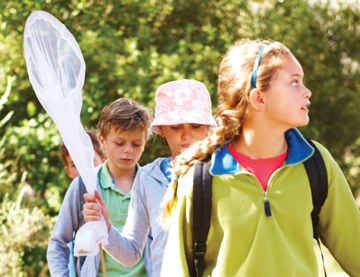Banner Image
Wednesday, 1 May, 2024 - 15:00

Getting students learning outside the classroom can be a valuable way to enhance their educational experiences and foster a deeper understanding of the world around them. Here are some ideas for teachers to facilitate learning outside the classroom:
- Field Trips: Organize field trips to museums, historical sites, nature reserves, science centers, or cultural institutions relevant to the curriculum. Field trips provide hands-on learning experiences and allow students to make real-world connections to classroom concepts.
- Outdoor Education: Take learning outdoors by conducting lessons or activities in the schoolyard, local park, or nature reserve. Outdoor education activities such as nature walks, scavenger hunts, or ecological surveys promote environmental awareness and connect students with the natural world.
- Community Service Projects: Engage students in community service projects that address local needs or issues. Volunteer activities such as beach clean-ups, tree planting, or assisting at a food bank provide opportunities for students to apply their skills and make a positive impact in their community.
- Guest Speakers and Experts: Invite guest speakers or experts from various fields to share their knowledge and experiences with students. Guest lectures, workshops, or panel discussions provide valuable insights and expose students to different perspectives and career pathways.
- Virtual Tours and Digital Resources: Explore virtual tours, online resources, and educational apps to supplement classroom learning. Virtual tours of landmarks, interactive simulations, or multimedia presentations can enrich students' understanding of complex topics and broaden their horizons.
- Cultural Experiences: Arrange visits to cultural events, performances, or exhibitions that celebrate diversity and promote cross-cultural understanding. Attending cultural festivals, art exhibits, or theatrical productions exposes students to different traditions, perspectives, and artistic expressions.
- Science Expeditions: Organize science expeditions or field studies to explore local ecosystems, geological formations, or environmental phenomena. Hands-on science experiments, data collection activities, or habitat surveys encourage scientific inquiry and critical thinking skills.
- Historical Reenactments: Stage historical reenactments or living history demonstrations to bring historical events to life for students. Dressing in period costumes, recreating scenes from the past, or visiting historical landmarks immerse students in history and foster a deeper appreciation for the past.
- Outdoor Sports and Recreation: Incorporate outdoor sports, recreational activities, or team-building exercises into the curriculum. Outdoor games, orienteering challenges, or ropes courses promote physical fitness, teamwork, and leadership skills while encouraging students to enjoy the outdoors.
- Student-Led Expeditions: Empower students to plan and lead their own learning expeditions or projects outside the classroom. Student-led expeditions foster autonomy, creativity, and collaboration while allowing students to pursue their interests and passions.
By incorporating these ideas into their teaching practices, teachers can inspire students to explore, discover, and learn beyond the confines of the classroom, creating memorable and meaningful learning experiences that enrich their education and personal growth.
Search SchoolActivities.com.au to discover some great educational school excursions near you.
